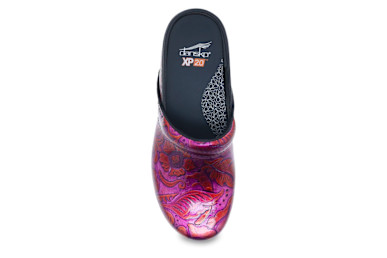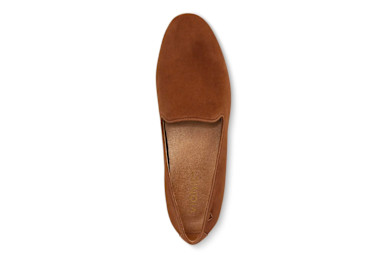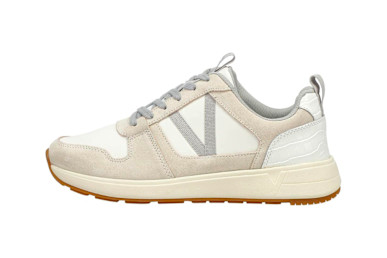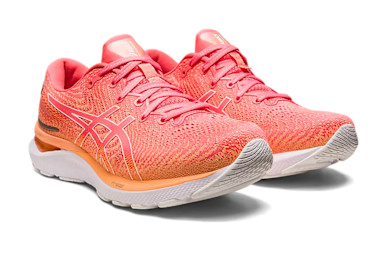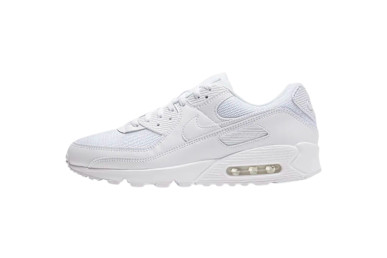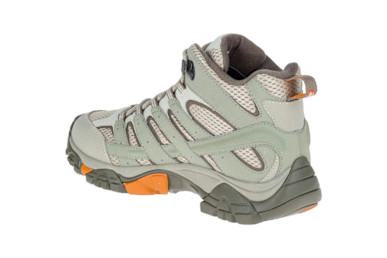The 12 Best Shoes For Back Pain + What Shoes To Avoid

There are plenty of reasons you may be experiencing back pain, and your footwear is a great place to start. If you haven't been paying proper attention to what you're wearing on your feet, pain relief could be as simple as switching out your everyday shoes with a more supportive pair.
The best shoes for back pain are supportive and responsive, with qualities that help relieve pain and prevent it from flaring up in the future.
To learn more about the correlation between footwear and back pain, we chatted with a podiatrist and consulted with the professional guidelines set forth by the American Podiatric Medical Association.
Using these insights, personal testing, and customer reviews, we've rounded up the best shoes for back pain, with options for every season and activity.
- Best casual: Cariuma LWG Sneaker
- Best gym shoe: Hoka Bondi 8
- Best for nurses: Dansko XP 2.0 Clogs
- Best flats: Vionic Willa Slip-on Flat
- Best slip-on: Oofos Oomg Eezee Low Shoe
- Best for leg & back pain: Vionic Curran Rechelle Sneaker
- Best for walking: New Balance 847 V4 Walking Shoe
- Best for running: Asics Gel-Cumulus 24
- Best slides: Cushionaire Feather Recovery Slide Sandals
- Best for men: Nike Air Max 90 Sneaker
- Best for runners with back and knee pain: Brooks Adrenaline GTS 22
- Best for hiking: Merrell Moab 2 Mid Gtx Hiking Boot
Can shoes make your back pain worse?
In short: yes. The wrong shoes can aggravate your back pain. Feet are the foundation of the body, so any imbalance due to high arches, low arches, or improper footwear can disrupt the function of the ankles, knees, hips, and back. According to Kornfeld, once the pelvis becomes unstable, muscles in the lower back will tighten and cause symptoms of back pain. Because we spend so much time in shoes, the right pair can make all the difference in supporting a healthy, pain-free back and spine.
How much does a pair of shoes for back pain cost?
You can expect to pay about $40 to $170 on a pair of high-quality shoes to help relieve and prevent back pain. Because the American Podiatric Medical Association has approved shoes in categories of sandals, slippers, sneakers, boots, and more, the options span a wide variety of budgets. In general, sneakers for back pain run on the higher end of the price spectrum, while you can find flats or sandals for a bit less. We've included a range of options on our list, with picks for plenty of activities.
What shoes should you avoid if you have back pain?
In addition to avoiding rigid shoes that don't easily bend easily in the forefoot, it's important to be mindful of the overall shoe design. Shoes with too much of an arch (or lack thereof) can exacerbate symptoms of back pain, so you'll need a shoe with proper arch support. Both high heels and flip-flops can affect your gait (aka your natural manner of walking), which negatively alters spinal alignment, causing knee, hip, and back pain. For this reason, it's crucial to be mindful of the overall support and how it affects your gait.
What to look for in shoes for back pain
When determining what shoes are best for back pain, podiatrists say it is particularly important to avoid a rigid design, or shoes that do not bend easily in the forefoot. "If the forefoot cannot extend properly, this causes excessive contracture of the calf muscles, which will overly flex the knees and unlock the pelvis," says Robert Kornfeld, DPM, of Manhattan's Chronic Foot Pain Center. Because an unstable pelvis leads to tightened lower-back muscles and pain, you'll want to be mindful of the rigidity of a shoe when making a selection.
Of course, other standard factors such as quality, material, budget, intended activities, and style preferences should be considered, too. Each of these will help narrow down your choices.
How we picked:
Podiatrist recommendations
We took expert insight into account and consulted the American Podiatric Medical Association's Seal of Acceptance and Seal of Approval list, which includes shoes found to promote good foot health.
Comfort
Comfort is key—especially when you're looking for relief from persistent back pain. We chose shoes that will live up to the comfort hype so you can breathe that sigh of relief while wearing them.
Versatility
Whether you're hitting the gym, heading out for a walk, or looking for a casual shoe, you don't want to be in pain. We've included a versatile list of shoes for many activities and occasions.
Price
We considered various budgets when selecting our picks and included a wide range of prices without sacrificing quality.
- Size
- 5-13, half sizes available
- Weight
- Not specified
- Materials
- Rubber, LWG-Certified premium leather
- Cushioning level
- Medium
Our editors love this Cariuma style for its support, versatility, and durable outsole. Ideal for daily wear, these sneakers are well-cushioned enough to keep your feet comfortable and stylish enough to pair with just about anything.
The details
The details
While only one width is available, our commerce editor, Braelyn Wood, confirms that these are accommodating for a wide foot. The shoes are made with a cushioned, ankle-hugging heel collar and the brand’s signature memory foam, which helps keep back pain at bay. Many reviewers with back and hip pain note relief from the cork insole, which provides just the right amount of cushion for long days.
Not only is the sustainable shoe made of leather sourced from LWG-certified Gold Rated tanneries (rather than cattle ranches on deforested lands), the brand also uses a more ethical rubber sourcing process, packages its products in recyclable boxes, and offsets its carbon emissions for shipping. Plus, two trees are planted for every pair of shoes sold. So you can feel as good about your impact as you do about your dissipating back pain.
Pros & cons
Pros & cons
Pros
- Mindbodygreen editor-loved
- Sustainable manufacturing & materials
- Removable insoles
Cons
- Leather is not washable
- Materials
- Rubber
- Cushioning level
- Extra
One of our favorite walking shoes for back pain, this lightweight pick features a moisture-wicking insole that makes it ideal for workouts or daily wear. The brand is known for its highly-cushioned sneakers, and this design has even received a stamp of approval from the APMA.
The details
The details
It has a full-length EVA foam midsole that offers significant cushioning, shock absorption, and stability, but still manages to not feel heavy on your feet.
These podiatrist-approved sneakers have more than 1,000 perfect five-star ratings from Dicks shoppers. Most reviews call out how comfortable they are, with many saying they came recommended from their doctor to help with foot pain.
Pros & cons
Pros & cons
Pros
- Cushioned
- Breathable
- Full-length foam midsole
Cons
- Bulkier design
- Runs narrow
- Size
- 5-12, half sizes available
- Weight
- 2 pounds
- Materials
- Leather
- Cushioning level
- Extra
If you’re prone to back pain and you spend all day on your feet, it’s particularly important that you pay attention to the shoes you’re wearing. Dankso clogs have become a favorite pick among healthcare workers who put in some serious steps during a long shift.
The details
The details
The shoes have a supportive structure, waterproof material, and comfortable design. This model comes recommended by the APMA and features an EVA midsole to provide additional stability and shock absorption.
These clogs have racked up more than 9,000 five-star ratings from Amazon shoppers alone, with nurses touting them as the only shoes they’ll wear.
Pros & cons
Pros & cons
Pros
- Waterproof
- Long-standing support
Cons
- Limited sizes available
- Sizes
- 5-11
- Weight
- 2 pounds
- Materials
- Leather, Suede
- Cushioning level
- Light
Dress shoes should be supportive too, and these slides are podiatrist-recommended. Plus, they come in 25 chic colorways to match whatever your personal style may be.
The details
The details
The footbed is cushioned to hug your arches, with a built-in orthotic that’s meant to prevent heel pain. Wide feet? No problem. These are available in both medium and wide, with plenty of reviewers raving about the spacious, comfortable fit.
Pros & cons
Pros & cons
Pros
- Stylish
- Easy to clean
- Designed for women
Cons
- Many sizes sold out
- Drop
- 6mm
- Weight
- 6 oz.
- Sizes
- 5-12
- Colorways
- 4
When you’re heading out the door in a hurry, or in need of a house shoe to throw on for added support, a slide-on option makes life easier. A wide toe box and spacious fit makes this one of our favorite shoes for people with bunions, and we've also chosen it as one of the best walking shoes for women.
The details
The details
The brand uses a proprietary foam that absorbs 37% more impact than traditional footwear, reducing stress on knees, ankles and joints—and, thus, reducing and preventing back pain. The stretchy, lightweight fabric is comfortable any time of year.
The overwhelming consensus is that these shoes are comfortable and supportive, and they're particularly loved by people with plantar fasciitis. Our commerce editor wears these, too, and recommends going up one half size.
Pros & cons
Pros & cons
Pros
- Shock absorption
- High-stretch fabric
Cons
- Run small
- Limited colorways
- Sizes
- 5-10
- Weight
- 2 pounds
- Materials
- Rubber, Leather, Suede
- Cushioning level
- Extra
This everyday pick is stylish enough for casual wear, but boasts the same supportive design you’d expect from a gym shoe or running sneaker. The APMA seal of acceptance confirms that they meet podiatrist standards, with a rubber sole, deep heel cup, and superior forefoot cushioning.
The details
The details
Your arches will breathe a sigh of relief thanks to the ultimate arch support midsole, which will keep you pain-free from the feet up.
It's no surprise that people with plantar fasciitis, back pain, and foot pain rave about these sneakers. Reviewers say they're comfortable, supportive, and versatile.
Pros & cons
Pros & cons
Pros
- Stable
- Well-cushioned
- Versatile
Cons
- Limited sizing
- Size
- 5-13, wide and narrow sizes available
- Weight
- 2 pounds
- Materials
- Rubber, Leather
- Cushioning level
- Medium
Don’t let back pain or uncomfortable sneakers get in the way of your hot girl walk. Instead, try these well-cushioned walking shoes to keep your feet and body pain-free.
The details
The details
The podiatrist-approved style is made with a lightweight, breathable mesh upper and a heel insert for added support and increased balance and stability. We love that these shoes are available in five width options: narrow, standard, wide, x-wide, and xx-wide. Plus, the leather material feels durable and long-lasting. Reviewers tend to agree, regarding these as excellent walking shoes and commenting on how much they’ve helped alleviate back pain and leg cramps.
Pros & cons
Pros & cons
Pros
- Breathable
- Durable
Cons
- Runs large
- Size
- 5-12, half sizes available, wide sizes available
- Weight
- 9.2 oz.
- Drop
- 12mm
- Cushioning level
- Extra
Runners know having the right pair of shoes can make a huge different in avoiding aches and pains—and ASICS makes some of our favorite running shoes for every experience level. Whether you're running distance, sprints, or keeping it at a brisk walk, you'll love the shock-absorbing design of the Gel Cumulus 24.
The details
The details
The lightweight shoe features a rear foot and forefoot cushioning system that reduces impact and encourages proper gait with each stride. Plus, the mesh upper is breathable in any temperature. The signature ASICS reflective accents are an added bonus for those who train outdoors in low-light conditions.
Reviewers agree that these shoes are great for running and for casual wear. A few mention that, while they've tried to switch it up, they tend to regret it because no other shoes are as supportive as these.
Pros & cons
Pros & cons
Pros
- Breathable
- Flexible and well-cushioned
- Great for running
Cons
- Not great for wide feet
- Size
- 5-12
- Weight
- 13.12 ounces
- Materials
- Waterproof foam
- Cushioning level
- Extra
With a simplistic design and a platform just under two inches, these recovery slide sandals may seem like an unlikely candidate to land on a list of shoes for back pain. But, thanks to the soft foam material, molded cushion footbed, and easy to wear design, reviewers have called these out as “lifesavers,” particularly for people with plantar fasciitis or back pain.
The details
The details
While they work great as a summertime slipper for arch support, you can wear them out and about, too. Rest assured, your feet will be comfortable no matter where you wear these sandals.
Shoppers with low back pain and sciatica issues say these shoes keep them comfortable even while standing and walking on concrete floors.
Pros & cons
Pros & cons
Pros
- Lightweight
- Arch support
- Non-slip sole
Cons
- Sizing can be difficult
- Size
- 6-15, half sizes available
- Weight
- Not specified
- Materials
- Leather and synthetic upper, Textile lining, Rubber and synthetic sole
- Cushioning level
- Medium
The iconic Max Air cushioning of the Air Max 90 Sneaker adds just the right amount of shock-absorption to keep back pain away, while maintaining its timeless silhouette. We love that they can be worn right out of the box, with no time needed to break them in—and reviewers agree.
The details
The details
They’re versatile and sleek, with a footbed that contours to your feet to maintain proper alignment and comfort. Bonus: the insole is removable, so if you require custom orthotics, these are a great pick. You’ll feel the buoyant cushioning with each step, reducing the impact on your joints to prevent any pain or discomfort.
Pros & cons
Pros & cons
Pros
- Versatile
- Sleek
Cons
- Can run small
- Drop
- 12mm
- Weight
- 10.2 oz
- Sizes
- 5-13
Pain can be one of the most frustrating things for runners, especially if you're having trouble pinpointing the cause. It's important to find a shoe with stability and support, like this pick from Brooks. It's a podiatrist-approved design meant specifically for those who tend to overpronate while running.
The details
The details
Reviewers with knee and ankle pain confirm that these shoes are comfortable and supportive, even through longer runs. They’re great for road running, cross training, or for use at the gym. The brand says this newest iteration was designed with knee injury in mind, and has even more cushioning for a softer, smoother landing with each stride.
Pros & cons
Pros & cons
Pros
- Supportive
- Wide sizing available
Cons
- Toe box is too narrow for some
- Size
- 5-11
- Weight
- 2.16 pounds
- Materials
- Synthetic leather and mesh upper, Metal hook lace closure, Rubber sole
- Cushioning level
- Medium
If hiking is your activity of choice, you'll want a boot that's designed to keep your feet and body supported. These are made with the brand's signature air cushioning in the heel, meant to absorb shock and add stability to prevent you from experiencing back pain.
The details
The details
The lace-up design is sturdy and secure, and truly feels as though it will stand the test of time.
Real adventurers will love the superior traction and waterproof material, which reviewers confirm is breathable and lightweight.
Pros & cons
Pros & cons
Pros
- Breathable
- Great traction
Cons
- On the heavier side
FAQ
Do shoes make a difference for back pain?
According to holistic podiatrist Robert Kornfeld, DPM, since every foot type has unique characteristics and interacts differently with ground forces, the type of shoe must be synergistic with the needs of that particular foot. He explains that if your shoe is not designed correctly for your unique foot shape and needs, forces absorbed by the foot will transfer up to the knee, hip, and low back, which inevitably causes pain.
Are orthopedic shoes good for back pain?
Orthopedic shoes are designed to fit the foot of the wearer and may eliminate "tight spots" and compression forces on the foot, which can lead to compensations in gait that can cause back pain. If your back pain is mostly due to foot deformity and conventional shoes are not a good fit, Kornfeld says orthopedic shoes may be a good solution.
What are the best sneakers for walking if you have a bad back?
"If back pain is coming from unstable, hypermobile feet, then walking shoes—which are more stable and more rigid than running shoes—would be the right shoe," Kornfeld says. "If the back pain is coming from rigid, nonflexible feet, then a soft, shock-absorbing running shoe would work best." In other words: It's not always (or ever) one-size-fits-all.
What type of shoes do you need if you have a lower-back problem?
Per Kornfeld, lower-back problems can be supported by choosing shoes with shock absorption, such as sneakers with inner soles for arch support and a high toe box to prevent crowding.
The takeaway
Back pain can be disruptive to any activity—but relief could be just a shoe swap away. These shoes are great for runners, walkers, and everyone in between.
If you're not sure which are best for you, we recommend speaking with your doctor to learn more about your own unique foot shape and needs.
And in the meantime, ease your pain while you sleep with one of our picks for the best mattress toppers for back pain.




